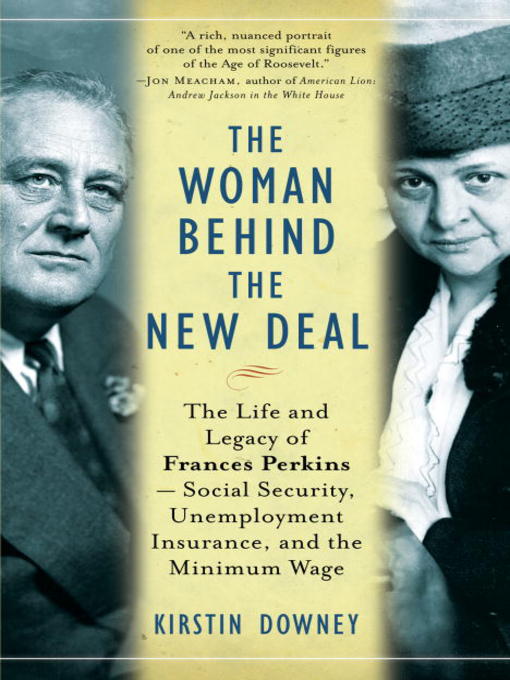
The Woman Behind the New Deal
The Life of Frances Perkins, FDR'S Secretary of Labor and His Moral Conscience
- اطلاعات
- نقد و بررسی
- دیدگاه کاربران
نقد و بررسی

Starred review from December 15, 2008
No individual—not even Eleanor Roosevelt—exerted more influence over the formulation of FDR's New Deal or did more to implement the programs than Frances Perkins (1880–1965). As former Washington Post
staff writer Downey makes plain in this deeply researched biography, the first female Cabinet member was the primary shaper of such new concepts as unemployment insurance, the 40-hour work week and—last but not least—Social Security. At a time when the United States stands at the brink of another economic meltdown calling for sweeping federal interventions, Downey provides not only a superb rendering of history but also a large dose of inspiration drawn from Perkins's clearheaded, decisive work with FDR to solve urgent problems diligently and to succeed in the face of what seemed insurmountable odds. Confronting family issues—a frequently institutionalized husband with severe psychiatric problems; a deeply secret lesbian relationship with Mary Harriman Rumsey (sister of Averell Harriman); a daughter from whom she was often estranged—Perkins nevertheless exhibited tireless grace under pressure again and again, always rising to the occasion in the name of every and any progressive cause.

December 15, 2008
The public recognition of historical figures ebbs and flows, not least for women who succeeded during times of rampant sexism; often, their popularity dwindles once interest has died down. With issues of sexism rising again, women who broke glass ceilings are now being reconsidered. Take Frances Perkins, one of FDR's confidants and the first female secretary of labor in U.S. history. In the late 1970s, a handful of Perkins biographies appeared, most notably George Martin's "Madam Secretary", and now we have Downey's adept psychobiography. Like many biographers, Downey ("Washington Post") is enamored of her subject. But her fascination serves her well, allowing her to construct an intriguing catalog of Perkins's achievements and explore the influences that held sway in her life, a psychological approach lacking in previous Perkins biographies. Here Perkins's triumphs and tragedies are compiled into a compelling narrative that never loses its scholarly touch. Recommended for larger public libraries and academic libraries.Suzan Alteri, Wayne State Univ. Lib., Detroit
Copyright 2008 Library Journal, LLC Used with permission.

Starred review from January 1, 2009
Much of the social reform that has made President Franklin D. Roosevelt so belovedSocial Security, fair labor practices, minimum wagewere actually ideas conceived and pushed by his labor secretary, Frances Perkins, the first female cabinet member and a woman constrained by the sexism of the era as well as her personal circumstances. Drawing on extensive archival research, Downey offers a riveting portrait of a determined social reformer who pushed a shrewd politician to make substantive changes in the American workplace. Early in her career as a social worker, Perkins witnessed the Triangle shirt factory fire that killed 146 workers. It was a pivotal point for her as she went on to lobby in Albany on behalf of workers, very consciously adopting a plain and dour look to remind the male legislators of their mothers and win more sympathy for her cause. Perkins was a politically savvy woman, able to adapt to Tammany Hall, New York Governor Al Smith, and, later, GovernorRoosevelt, all along managing the bosss wife as well as the boss himself. As part of FDRs cabinet, she championed workers rights through the Great Depression and World War II, helping to keep alive the International Labor Organization. As the nation struggles through its current economic crisis, this compelling biography is particularly timely.(Reprinted with permission of Booklist, copyright 2009, American Library Association.)




دیدگاه کاربران